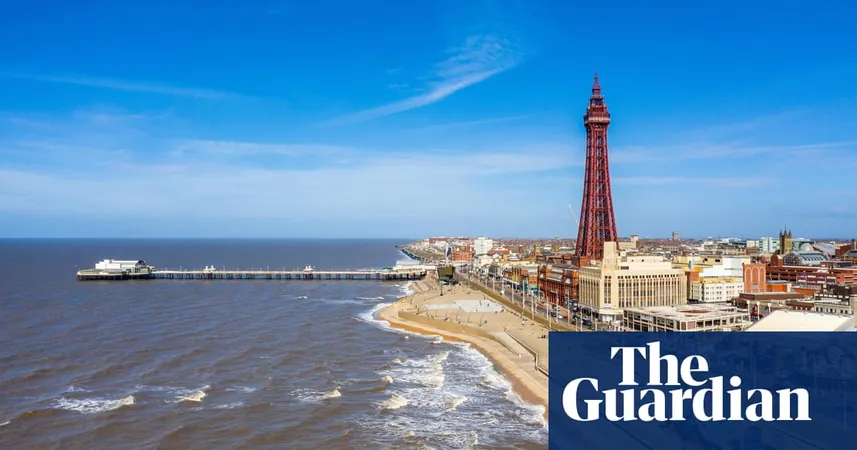
Blackpool's Alarming Life Expectancy Decline: A Seaside Town in Crisis
2024-12-09
Author: Emily
Introduction
Blackpool, once a bustling seaside resort known for its vibrant attractions, has now become synonymous with a troubling statistic: it has the lowest average male life expectancy in the UK, overtaking Glasgow for the first time in 20 years. According to the latest figures from the Office for National Statistics (ONS), men born in Blackpool can expect to live just past their 73rd birthday, which is six years less than the national average in England.
Socioeconomic Factors Impacting Health
This grim reality starkly illustrates a persistent truth in modern Britain: socioeconomic status has a profound impact on health outcomes. The north-south divide in life expectancy is becoming more apparent, with those in affluent regions like Hampshire’s Hart district living an entire decade longer than their counterparts in economically disadvantaged areas. The gap has widened since the Covid pandemic, with Blackpool's male life expectancy plummeting by 18 months since 2019.
Decline of Blackpool's Economy
The underlying causes of Blackpool's public health crisis are rooted in the town's historic decline. Once a favored holiday destination, Blackpool has suffered from an oversaturation of guesthouses and a subsequent decline in tourism, as vacationers increasingly favor warmer climates abroad. Property speculators seized the opportunity, converting old guesthouses into houses in multiple occupation (HMOs), where profit margins can reach up to 20%. This shift has led to the proliferation of low-quality housing, attracting residents dealing with health-related challenges. Rental prices in Blackpool are shockingly low, with a one-bedroom flat near the iconic Big Dipper rollercoaster costing just over £100 a week—less than half the UK’s average rent.
Public Health Initiatives
Dr. Arif Rajpura, Blackpool's director of public health, faces the daunting task of addressing the town's health disparities. With the town’s rates for cancer, cardiovascular diseases, and overall mortality among individuals under 75 being the highest in England, Rajpura refers to his public health team humorously as a "paid nuisance" for their interventions against new fast food outlets and alcohol advertisers, advocating for healthier community options. Dr. Andy Knox, a leading GP in the region, argues that addressing health inequalities in Blackpool requires a systemic overhaul. He emphasizes the need for a reformed funding structure for councils, better integration between the NHS and local authorities, and potentially revolutionary policies such as a sugar tax to address unhealthy lifestyle habits that stem from socio-economic challenges. In his book Sick Society, Knox points out that unhealthy behaviors cannot merely be attributed to personal choices, highlighting that many individuals' health trajectories begin with childhood trauma and adverse socio-economic conditions.
Children in Care and Associated Issues
Blackpool also grapples with the highest proportion of children in care in the UK, with a staggering 70 to 80% of these children living in the bottom fifth of the socio-economic spectrum, leading to a cascade of negative consequences including poor educational outcomes, high unemployment rates, and deteriorating physical health.
Drug and Alcohol-Related Deaths
Recent reports have painted a dire picture, indicating that Blackpool has quadrupled the average number of drug-related deaths and recorded the highest rates of smoking and alcohol-related fatalities along with serious mental health issues. Experts agree that preventative measures are crucial. Unfortunately, funding cuts imposed during austerity, particularly affecting poorer areas like Blackpool, have decimated access to essential health services. The town has lost a significant portion of its public health funding—about £1,400 less per person than a decade ago, with additional cuts since 2013.
Call for Change
As Karen Smith, the council's director of health and care integration, states, there is a pressing need for a shift in focus: “We must drag ourselves away from solely dealing with immediate pressures and start investing in preventive measures to improve health outcomes.” However, in a town where it often feels like "the whole world is on fire," making these changes seems a daunting challenge.
Conclusion
Blackpool’s situation raises urgent questions about the future of public health policies in the UK and serves as a stark reminder of the effects of inequality on life expectancy. Can this once-glamorous resort reclaim its stature, or will it remain a cautionary tale of what happens when health and wealth become starkly divided?









 Brasil (PT)
Brasil (PT)
 Canada (EN)
Canada (EN)
 Chile (ES)
Chile (ES)
 España (ES)
España (ES)
 France (FR)
France (FR)
 Hong Kong (EN)
Hong Kong (EN)
 Italia (IT)
Italia (IT)
 日本 (JA)
日本 (JA)
 Magyarország (HU)
Magyarország (HU)
 Norge (NO)
Norge (NO)
 Polska (PL)
Polska (PL)
 Schweiz (DE)
Schweiz (DE)
 Singapore (EN)
Singapore (EN)
 Sverige (SV)
Sverige (SV)
 Suomi (FI)
Suomi (FI)
 Türkiye (TR)
Türkiye (TR)